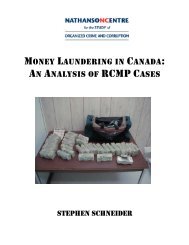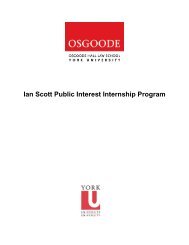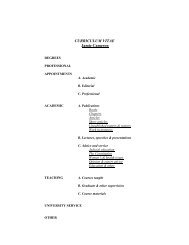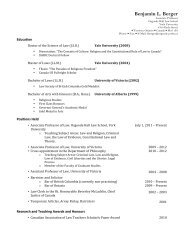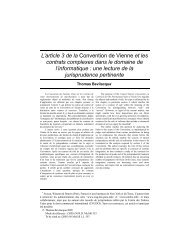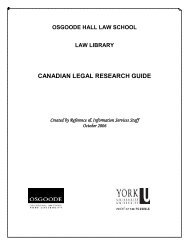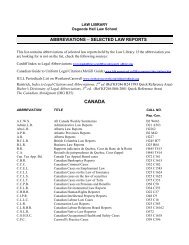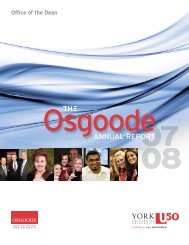The Impact of Global International Informal Banking on Canada
The Impact of Global International Informal Banking on Canada
The Impact of Global International Informal Banking on Canada
Create successful ePaper yourself
Turn your PDF publications into a flip-book with our unique Google optimized e-Paper software.
As stated previously, the business individual interviewed cannot be c<strong>on</strong>sidered Financial Agents<br />
in the above stated c<strong>on</strong>venti<strong>on</strong>al c<strong>on</strong>text. <str<strong>on</strong>g>The</str<strong>on</strong>g>y do not advertise or transact business for clients.<br />
<str<strong>on</strong>g>The</str<strong>on</strong>g>y have ‘business associates’, ‘dealings’ and ‘investments’ for themselves. Mostly all<br />
transacti<strong>on</strong>s are trade based. And detailed documentati<strong>on</strong> or record keeping are integral to<br />
business dealings.<br />
Reputati<strong>on</strong>, trust and or fear / threat <str<strong>on</strong>g>of</str<strong>on</strong>g> lost <str<strong>on</strong>g>of</str<strong>on</strong>g> wealth underscores these transacti<strong>on</strong>s. It ensures<br />
that transacti<strong>on</strong>s are executed efficiently, to the benefit <str<strong>on</strong>g>of</str<strong>on</strong>g> all interacting parties. Following are a<br />
few methods that ‘every<strong>on</strong>e’ in the industry uses:<br />
Mis-invoicing was stated to be a popular method. Due to the black market and/or cash ec<strong>on</strong>omy, a<br />
lot <str<strong>on</strong>g>of</str<strong>on</strong>g> ‘black’ funds are accumulated in India. But these funds have limited use (because they<br />
cannot be used for investments, large purchases or deposited into bank accounts). To use the<br />
funds (i.e., to c<strong>on</strong>vert them from unusable ‘black’, to usable ‘white’), trade transacti<strong>on</strong>s are<br />
undertaken by certain business individuals. Transacti<strong>on</strong>s are over-invoiced or under-invoiced.<br />
Over-invoiced: For example, the price <str<strong>on</strong>g>of</str<strong>on</strong>g> goods exported from India is inflated two or three times.<br />
<str<strong>on</strong>g>The</str<strong>on</strong>g> exporter/business pers<strong>on</strong> in India bills his business partner (in the other jurisdicti<strong>on</strong>) for the<br />
actual amount <str<strong>on</strong>g>of</str<strong>on</strong>g> the black funds that require c<strong>on</strong>versi<strong>on</strong>. <str<strong>on</strong>g>The</str<strong>on</strong>g> partner (up<strong>on</strong> receiving the<br />
product), transmits the funds through legitimate channels, minus the fee for c<strong>on</strong>versi<strong>on</strong> <str<strong>on</strong>g>of</str<strong>on</strong>g> funds.<br />
Often the actual transfer <str<strong>on</strong>g>of</str<strong>on</strong>g> black funds from India to the sec<strong>on</strong>d jurisdicti<strong>on</strong> (for example,<br />
<strong>Canada</strong>) takes place through the informal process. Thus, the business individual in India<br />
successfully c<strong>on</strong>verts the ‘black’ funds into ‘white’ funds up<strong>on</strong> receiving the check for the goods<br />
shipped from the Canadian entity. <str<strong>on</strong>g>The</str<strong>on</strong>g>se ‘white’ funds can now be used openly as legitimate<br />
investments, business purposes or future transacti<strong>on</strong>s. And c<strong>on</strong>versi<strong>on</strong> fees paid for these<br />
transacti<strong>on</strong>s can be up to 12% <str<strong>on</strong>g>of</str<strong>on</strong>g> the amount <str<strong>on</strong>g>of</str<strong>on</strong>g> funds c<strong>on</strong>verted.<br />
Under-invoiced: Transacti<strong>on</strong>s are under-invoiced in an export transacti<strong>on</strong> from India (i.e., goods<br />
are exported at a huge discount). When the goods are sold in the destinati<strong>on</strong> country (<strong>Canada</strong> or<br />
the United States), a surplus is created for the benefit <str<strong>on</strong>g>of</str<strong>on</strong>g> the business individual (in India). This<br />
surplus is created because the price at which the product is sold in the destinati<strong>on</strong> country is its<br />
actual value in additi<strong>on</strong> to a pr<str<strong>on</strong>g>of</str<strong>on</strong>g>it, as is normal business practice. <str<strong>on</strong>g>The</str<strong>on</strong>g> ‘quota system’ (i.e., fixed<br />
amount <str<strong>on</strong>g>of</str<strong>on</strong>g> licenses issued by governments) assists the exporters c<strong>on</strong>siderably in this process.<br />
<str<strong>on</strong>g>The</str<strong>on</strong>g>se quotas are <str<strong>on</strong>g>of</str<strong>on</strong>g>ten limited (i.e., given to a few exporters <strong>on</strong>ly) and for a fixed time. Also, it<br />
has the effect <str<strong>on</strong>g>of</str<strong>on</strong>g> under cutting competiti<strong>on</strong> in the market to the benefit <str<strong>on</strong>g>of</str<strong>on</strong>g> the exporter.<br />
But the actual effect <str<strong>on</strong>g>of</str<strong>on</strong>g> the practice is that the process results in the business individual (in India)<br />
having surplus ‘white’ funds in another jurisdicti<strong>on</strong> (i.e., the individual having ‘holdings’ or<br />
‘interests’ or ‘nest eggs’ safely away from the domestic governments scrutiny). Real estate<br />
investments in <strong>Canada</strong>, was menti<strong>on</strong>ed as a safe preference for the use <str<strong>on</strong>g>of</str<strong>on</strong>g> the surplus funds. At<br />
times, these funds are sent back to India and used openly as ‘white’ funds. Or they are used to<br />
fund other transacti<strong>on</strong>s or to settle accounts for previous transacti<strong>on</strong>s. Bulk goods for sale in<br />
dollar stores, fabrics, electr<strong>on</strong>ics, tea, furniture, etc, were menti<strong>on</strong>ed as examples for these<br />
transacti<strong>on</strong>s.<br />
Duty draw backs: Tied to these processes intricately are the duty draw back schemes. <str<strong>on</strong>g>The</str<strong>on</strong>g>re is an<br />
32



